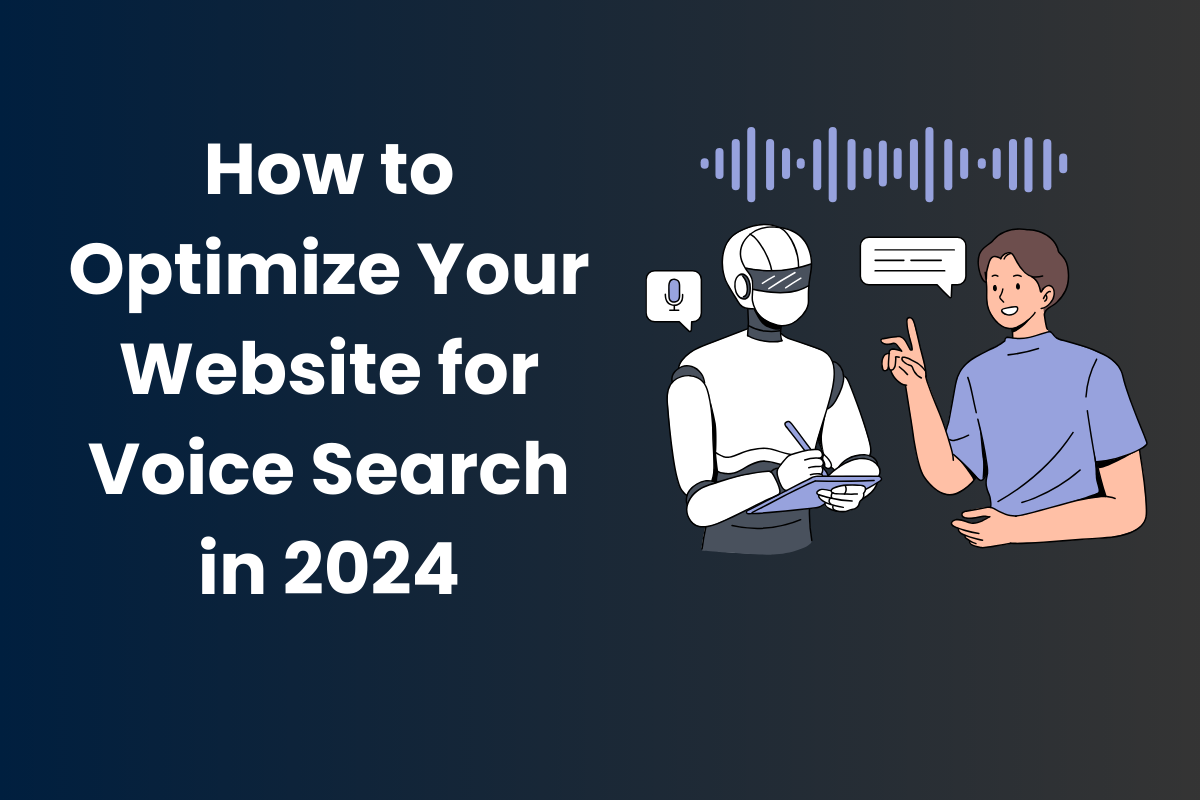Voice search is transforming the way people find information online. With the rise of smart speakers and voice-activated assistants, optimizing your website for voice search isn’t just smart—it’s necessary! In this guide, we’ll cover why voice search is important and provide easy-to-follow tips to help you optimize your website for voice search in 2024 and shine in voice search results.
Why Voice Search Matters
More and more people are using their voices to search for information. In fact, studies show that around 55% of households are expected to own a smart speaker by 2024. This shift means your business needs to adapt. Voice searches are often different from typed searches—they tend to be more conversational and question-based. If you want your website to be found, you’ll need to optimize for this new way of searching!
According to research, about 71% of people prefer to conduct voice searches rather than typing. This trend is largely driven by the convenience of simply asking a question rather than fiddling with a keyboard. Furthermore, voice search can provide quicker answers, making it especially popular among users looking for immediate information.
So, how can you make sure your website stands out in voice search results? Let’s dive into some simple yet effective strategies!
1. Use Natural, Conversational Language
When people speak, they often use more natural language. This means your website should sound like a conversation! Instead of using complicated terms or jargon, try to write the way people talk. This not only makes your content easier to read but also helps search engines understand it better.
For example, instead of writing, “Our services include web development and design,” you could say, “We can help you create a stunning website.” This shift to more relatable language not only captures the audience’s attention but also aligns better with how voice search queries are formed.
2. Focus on Long-Tail Keywords
Voice searches often involve longer phrases, known as long-tail keywords. For instance, instead of typing “best pizza,” someone might say, “Where can I find the best pizza near me?” To optimize for this, think about the questions your customers might ask and incorporate those phrases into your content.
Using tools like Google Keyword Planner or AnswerThePublic can help you discover commonly asked questions related to your industry. For example, if you own a bakery, keywords might include “best gluten-free cupcakes in [Your City]” or “where to buy fresh bread near me.”
3. Optimize for Local Searches
Many voice searches are local, like “coffee shops near me.” To capture this traffic, ensure your website is optimized for local SEO. Include your business’s name, address, and phone number (NAP) on your site, and register with Google My Business. This helps search engines show your business in local results.
Make sure to update your Google My Business profile with accurate information, including your hours of operation, services, and even photos of your business. According to a survey, 46% of all Google searches are looking for local information, highlighting the need for effective local SEO.
4. Use Structured Data Markup
Structured data helps search engines understand your content better. By using schema markup, you can provide additional context about your content. This can improve your chances of appearing in rich snippets, which are often read aloud by voice assistants. Implementing this may sound technical, but many plugins can help you do this easily!
For instance, if you have a recipe website, using structured data can help Google present your recipes in a way that is more appealing to voice search users. They can say, “Hey Google, find me a chocolate cake recipe,” and Google can pull your recipe directly, complete with preparation time and ratings.
5. Improve Your Website’s Loading Speed
A fast website is essential for good user experience, and it also helps with voice search. If your site takes too long to load, visitors will leave before they even get a chance to see your content. Tools like Google PageSpeed Insights can help you identify areas to improve.
Some quick tips to improve your website’s speed include:
- Optimize images by compressing them without losing quality.
- Minimize HTTP requests by combining CSS and JavaScript files.
- Enable browser caching to speed up repeat visits.
By ensuring your site loads quickly, you not only enhance user experience but also improve your search rankings.
6. Create an FAQ Page
An FAQ page is a great way to optimize for voice search. It allows you to answer common questions directly, making it easier for voice assistants to pull relevant information. When creating this page, focus on questions that are relevant to your business and industry.
For example, if you run a pet store, your FAQ could include questions like:
- “What are the best foods for puppies?”
- “How do I train my dog to sit?”
This direct approach not only provides value to your visitors but also helps search engines connect your content to the questions people are asking.
7. Ensure Your Website is Mobile-Friendly
Since most voice searches occur on mobile devices, having a mobile-friendly website is crucial. Make sure your site is responsive and looks good on all screen sizes. This not only helps with voice search but also improves overall user experience.
Google has adopted a mobile-first indexing approach, meaning that the mobile version of your site is the primary version that Google indexes. This further emphasizes the importance of having a well-designed mobile site.
8. Utilize Page Titles and Meta Descriptions Wisely
Your page titles and meta descriptions are vital for SEO. They give search engines a summary of your content. Make sure to include relevant keywords, especially long-tail phrases that people might use in voice searches. This helps improve your chances of being featured in search results.
Craft your meta descriptions to be enticing and informative. They should accurately reflect the content of the page and encourage clicks. For example, instead of a bland description like, “This page is about pizza,” try something more engaging like, “Discover where to find the best gourmet pizza in your neighborhood!”
9. Leverage Social Media
While social media isn’t directly tied to voice search optimization, it plays a role in your overall online presence. When you share your content on social platforms, it can generate traffic back to your website. This increased traffic signals to search engines that your content is valuable, which can help improve your search rankings.
Engage with your audience by sharing tips, articles, and promotions on your social channels. Use hashtags to increase visibility and connect with users who might be interested in your services.
10. Monitor and Adjust Your Strategy
Voice search technology is evolving rapidly, and it’s important to keep up with the changes. Regularly monitor your website’s performance using tools like Google Analytics and Google Search Console. Look for trends in voice search queries and adjust your strategy accordingly.
Stay informed about new developments in voice search technology, as they can impact how you optimize your content. Join forums or follow experts in the SEO field to learn about best practices and emerging trends.
Conclusion
Optimizing your website for voice search doesn’t have to be daunting. By using natural language, focusing on long-tail keywords, and ensuring your site loads quickly, you can improve your visibility in voice search results. Keep these tips in mind as you make updates to your site, and you’ll be well on your way to reaching more customers through voice search!
Frequently Asked Questions
Q1: What is voice search optimization?
Voice search optimization involves adjusting your website’s content and SEO strategy to cater to voice-based queries, ensuring it is easily found and understood by voice search technologies.
Q2: Why is local SEO important for voice search?
Local SEO is crucial because many voice searches are location-based. Optimizing for local searches ensures your business appears in relevant results when potential customers search for services near them.
Q3: How can I improve my website’s loading speed?
You can improve your website’s loading speed by compressing images, minimizing code, and using a reliable web hosting service. Tools like Google PageSpeed Insights can help you identify specific improvements.
Q4: What role does social media play in voice search optimization?
While not directly linked, social media can drive traffic to your site, improving your online presence and indirectly helping with SEO. Engaging content shared on social platforms can lead to increased visibility in search results.
Q5: How often should I update my voice search optimization strategy?
It’s essential to regularly review and update your strategy as voice search technology evolves. Monitor your website’s performance and stay informed about the latest trends in voice search to maintain your competitive edge.









